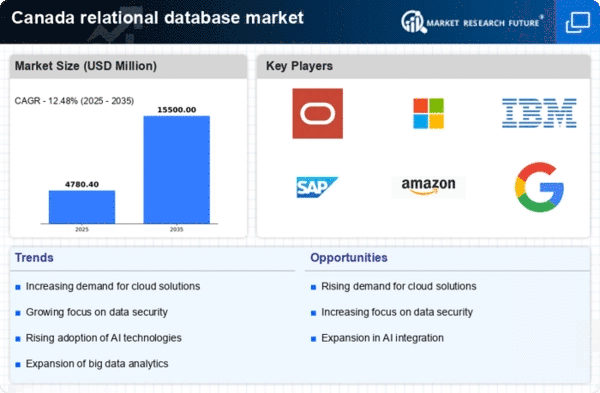Rise of Hybrid Cloud Solutions
The shift towards hybrid cloud architectures is influencing the relational database market in Canada. Organizations are increasingly adopting hybrid models to balance the benefits of on-premises and cloud-based solutions. This trend is likely to enhance the demand for relational databases that can seamlessly integrate with both environments. The relational database market is adapting to this shift by offering solutions that support hybrid deployments, enabling businesses to optimize their data management strategies. Recent data indicates that the hybrid cloud market in Canada is expected to grow by approximately 15% annually, which could significantly impact the relational database market as companies seek flexible and scalable database solutions.
Growing Demand for Data Analytics
The increasing reliance on data-driven decision-making is propelling the relational database market in Canada. Organizations across various sectors are recognizing the value of data analytics to enhance operational efficiency and customer engagement. As a result, the demand for relational databases, which facilitate structured data storage and retrieval, is on the rise. According to recent statistics, the data analytics market in Canada is projected to grow at a CAGR of approximately 12% over the next five years. This growth is likely to drive investments in relational database technologies, as businesses seek to leverage their data for competitive advantage. The relational database market is thus positioned to benefit from this trend, as companies invest in robust database solutions to support their analytics initiatives.
Increased Focus on Data Governance
In Canada, the emphasis on data governance is becoming a critical driver for the relational database market. Organizations are increasingly required to comply with stringent regulations regarding data management and privacy. This has led to a heightened focus on implementing relational databases that offer robust governance features, ensuring data integrity and security. The relational database market is responding to this demand by providing solutions that facilitate compliance with regulations such as PIPEDA and other provincial laws. As businesses prioritize data governance, the adoption of relational databases is expected to rise, with a projected market growth of around 10% in the coming years. This trend underscores the importance of relational databases in maintaining compliance and managing data effectively.
Emergence of Real-Time Data Processing
The need for real-time data processing is becoming a pivotal factor in the relational database market in Canada. As businesses strive to enhance customer experiences and operational efficiency, the ability to process and analyze data in real-time is increasingly essential. This trend is driving the development of relational databases that support real-time analytics and transaction processing. The relational database market is witnessing innovations aimed at improving performance and reducing latency, which are critical for real-time applications. With the growing demand for instant insights, the market for relational databases is projected to expand by around 11% over the next few years, reflecting the importance of real-time capabilities in modern data management.
Expansion of E-Commerce and Digital Services
The rapid expansion of e-commerce and digital services in Canada is significantly impacting the relational database market. As more businesses transition to online platforms, the need for reliable and scalable database solutions becomes paramount. Relational databases play a crucial role in managing customer data, transactions, and inventory in real-time. The relational database market is likely to benefit from this trend, as e-commerce sales in Canada are projected to reach over $50 billion by 2026. This growth is expected to drive investments in relational database technologies that can support the increasing volume of transactions and data management needs, thereby solidifying the market's position in the digital economy.
















